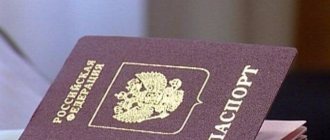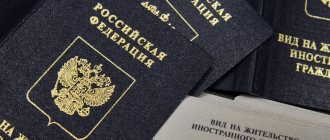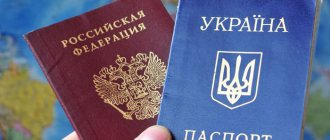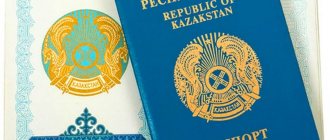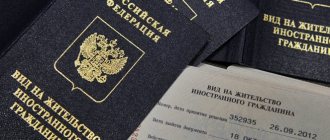In online journalism, a seemingly childish mistake often occurs. Despite a number of obvious differences, many equate the concepts of “nationality” and “citizenship”. And it is wrong, because each of them has not only its own legal meaning, but also a different legal nature of its occurrence. Of course, some similarities cannot be denied, but the difference that exists between them certainly does not allow them to be identified and replaced with each other. Let's look at the difference between citizenship and nationality and what Peter I has to do with it.
Citizenship: what is it
It is enough at least that citizenship, in contrast to citizenship, has a legislative definition: according to Article 3 of the Federal Law of May 31, 2002 No. 62-FZ “On Citizenship of the Russian Federation”, this is the political and legal relationship between a citizen of the country and Russia as a state entity , expressed in the rights and obligations assigned to them by law.
The essence of this relationship is that the state stands for the protection of human rights and freedoms, provides him with its protection when he is outside the country, in exchange for which the citizen undertakes to comply with the Constitution, laws and other regulations.
Taken together, all this constitutes the legal status of a citizen, which we will talk about a little later.
The law provides several ways to become a citizen of Russia, among them the most common:
- birth from Russians or on the territory of Russia from foreigners, if the parents’ countries of nationality do not grant the child indigeneity by right of blood;
- naturalization – that is, granting citizenship to foreigners and stateless persons.
Although, other options are possible, for example, the Crimean option - the choice of citizenship due to a change in the territory of the country.
Nationality: what is it
Unlike citizenship, current Russian legislation does not provide for such a concept as “nationality”. Usually, the term “nationality” also refers to the political and legal connection of an individual - a subject directly with the monarch, as the head of state, and not as with a territorial entity. Moreover, such a connection is one-sided: the monarch has no obligations towards his subjects. Nationality is theoretically possible only in states with a monarchical system of government, which was the case in most countries of medieval Western Europe.
In its history, the institution of citizenship is closely associated with feudalism - when the landowner had power over those who were on his land. By the way, it has not always found any normative support. For example, until the 18th century, Russian law did not define at all what Russian citizenship meant and did not contain specific differences between Russian citizens and foreigners. Only in 1700 did it become possible to “naturalize”, but this could only be done by adopting the Orthodox faith. The fact of being born to foreigners, even on the territory of what was then Russia, did not mean anything and did not make one a citizen.
The first opportunity to “naturalize”, that is, to become a citizen, was introduced by Peter I.
Since 1721, he introduced such a definition as “an oath of citizenship.” It could be brought by any foreigner wishing to purchase land or an estate in Russia. Taking the oath implied voluntary entry into the service of the sovereign. This meaning of the oath - as an instrument of naturalization - remained until the beginning of the 19th century.
The legislation of the Russian Empire of the 19th century already distinguished between Russian subjects and foreigners: the latter had significant restrictions, in particular in economic rights due to the presence of foreign citizenship. However, even taking the oath of allegiance to the Russian sovereign did not mean for them that such citizenship of a foreign state would be transformed into Russian citizenship. Even after taking the oath and naturalization, they were still not considered “full” subjects, such as Russians by birth. Although they had a number of privileges as a result. It is worth noting that in those days there were several categories of subjects, among which were natural, that is, by birth, natives of Finland, foreigners and a number of other categories.
Full equalization of citizens' rights occurred only in the mid-60s of the 19th century. Citizenship in pre-revolutionary Russia was already beginning to acquire some characteristics of citizenship. Thus, despite the declared loyalty to the sovereign as the sole source of power, the moral duty of every Russian person was to contribute to the welfare of the state, first and foremost. After the fall of the monarchical system, the institution of citizenship appeared in Russia, although in essence it was significantly different from the modern understanding.
It is difficult to fully answer in which countries citizenship was able to be preserved in the understanding in which it originated. The fact is that many monarchical countries still use it in relation to their citizens, but they put into it the meaning of citizenship, that is, connections with the state, and not with the head of state, which is legally incorrect.
Grounds for accepting citizenship
Acceptance of citizenship in Russia could be accomplished on one of three grounds:
- By right of birth. If the mother and father were Russian subjects, their child was considered a Russian subject. This order is also called the “principle of blood.” It had a broad interpretation, which consisted in the fact that a Russian subject was also a person born abroad or on a foreign ship. The only requirement was mandatory registration of the act of birth at a foreign mission.
- Upon marriage. If a foreign woman married a Russian subject, she automatically received Russian citizenship, without taking an oath. When the marriage was dissolved, her status remained the same. When a Russian subject married a foreigner, she became a foreigner. Their children could be accepted as Russian citizens under a simplified procedure. Upon adoption, citizenship did not automatically change.
- During naturalization, or rooting. Until 1864, a foreigner only had to submit a petition to the provincial office and take an oath. After February 10, 1864, a five-year full-time residence requirement was required. The petition had to be submitted to the Minister of Internal Affairs.
What are the similarities and differences between the concepts of “citizenship” and “nationality”
All of the above allows us to concretely formulate how citizenship differs from citizenship and how these concepts are similar. Their similarity, of course, is that they both represent a political and legal connection between an individual and a subject of supreme power, which determines the legal status of this individual within the framework of relations with this subject of power, other individuals, and so on. It should be noted that in this context, many languages of the world denote both citizenship and nationality in one word, distinguishing them only by context.
Nevertheless, the legal nature and relationship between the concepts of citizenship and nationality allows us to identify three main differences:
- firstly, it is the subject with whom the relationship is determined. In the case of citizenship, we are talking exclusively about the ruler, who is the sole embodiment of power, autocracy. Citizenship provides for a connection with the state, and in a broader sense, since citizenship is primarily an instrument not of power, but of a guarantee of rights;
- secondly, this is the nature of the connection - the fact is that the relationship of citizenship is a one-way connection, expressed in loyalty to the ruler; loyalty to his subjects on the part of the monarch, in principle, was not provided for. Citizens can count on a two-way relationship with the state, within which the citizen, just like the state, is assigned certain rights and obligations;
- thirdly, this, of course, is the regime of government - citizenship is possible only in countries with a monarchical form of government, where the source of power is the ruler, king or other monarch.
The difference between citizenship is that the latter is a characteristic of a democratic country, although it can also be used for totalitarian regimes, and even for the same monarchy, which is the case today, for example, in Saudi Arabia or the UK. In the latter, by the way, there are both citizens and subjects, who are perceived in a broader sense far beyond the borders of the country itself.
What is the difference between the status of nationality and the status of citizenship?
In global constitutional law, two terms are used - citizenship and nationality. They are similar, but in order to use them correctly, you should clearly know what their features and differences are. This is important, as it will eliminate mistakes in official documents and awkward situations in conversations.
- The concept of citizenship in world law
- The concept of citizenship in world law
- Features of legal statuses
- Similarities and differences
- Conclusion
- Nationality: Video
This is important, as it will eliminate mistakes in official documents and awkward situations in conversations.
Conclusion
Summarizing all of the above, we can highlight several obvious differences between citizens and subjects. First, citizens are loyal to the state, and subjects are loyal to the monarch. Secondly, the state is mutually faithful to its citizens, patronizing them in every possible way, which cannot be said about the traditional relationship between the monarch and their subject. Thirdly, citizenship has simply become obsolete, since any democratic state recognizes its citizens, and not the ruler, as the only source of power.
spouses of Russian citizens;
Definition of citizenship and nationality
International law states that citizenship is a legal bond between a state and an individual. It is expressed in mutual rights and obligations defined by the Constitution and other normative documents.
A person's citizenship is documented and confirmed by the issuance of an identity card. This concept is used in a state with a republican form of government during the development of the legal system.
But the concept of “citizenship” was the first to appear and was used in countries where a monarch ruled. It is rather a one-sided relationship between a person and a ruler, rather than a state.
Such a connection was not secured by any document, but was expressed only in residence on the territory of the state.
This is less a legal and more a historical and cultural connection between a person and the state. Citizenship is still often used under monarchical rule.
In Russia, subjects were in the Russian Empire, and today free citizens live in the country.
This concept is used in a state with a republican form of government during the development of the legal system.
Rights and freedoms of citizens and subjects
The institutions of citizenship and nationality are most clearly distinguished by the rights that arise as a result for citizens and subjects, respectively. Thus, citizenship as an institution of democracy is a tool for acquiring a wide range of equal rights for all citizens, regardless of their social status, financial status, religion, nationality or skin color.
Citizens always have the fullest range of rights than anyone else, because the state perceives them as the subjects closest to itself. Moreover, all rights that are granted to citizens are guaranteed to them on the territory of such a state.
As for citizenship, in the classical understanding of the connection with the monarch, it did not provide for any rights at all, but consisted only in the obligation assumed by the subject to remain faithful to the sovereign. However, as society developed and divided it into classes (which was also the case in the Russian Empire), one of the main criteria for such differentiation became a set of rights: that is, less privileged subjects had fewer rights than more privileged ones. In the modern understanding, countries that still call their citizens “subjects” do not provide for any infringements in relation to them.
About citizenship
In a sense, this term can be considered obsolete. Even in modern monarchies, the institution of citizenship has already been created and documented. That is, responsibilities and rights are enshrined on paper. And this is exactly how the concepts of “nationality” and “citizenship” differ, by and large. The first, we repeat, speaks of the relationship between a person and the monarch, the second describes his connection with the state. Citizenship initially presupposed residence in a certain territory, and in Russia it also meant belonging to a Christian community. Confusion arose with foreigners. They did not automatically receive citizenship. And the children of foreigners were also considered strangers. To change the situation, Peter I by decree established the possibility of obtaining Russian citizenship in a special way. To do this, the foreigner was required to take an oath of allegiance to the sovereign. This historical fact only confirms that citizenship is a concept that describes a person’s relationship with the monarch. In contrast, citizenship does not depend on the head of state. In addition, a person cannot be deprived of this privilege unilaterally.
Legal status of the individual in Russia
You need to understand that the legal status of an individual in Russia is a much broader concept than the status of a citizen. If the latter is understood only as a connection between certain individuals, then the legal status of an individual is a set of rights and obligations in relations with the state for any person. The law distinguishes between concepts such as “person” and “citizen”, perceiving the latter in a much narrower sense. Thus, a person can be not only a citizen, but also a foreigner or stateless person. For these categories, the state can provide both general metrics and specific features of status.
Most of the personal rights and freedoms guaranteed to all individuals are enshrined in the Constitution. Among them are the right to life, liberty, health, protection of private property, and so on. Along with such guarantees, each person is assigned certain responsibilities: to comply with the Constitution and laws, the rights of third parties, pay taxes, and so on. All this forms the basis of the legal status of an individual in Russia.
How to acquire Russian citizenship
As we have already said, the only obvious option for foreigners to obtain citizenship is naturalization (going through the admission procedure).
In general cases, when a foreigner does not claim any benefits, according to Article 13 of the Law on Citizenship of the Russian Federation, he will be required to:
- live on the basis of a residence permit in Russia for a 5-year period (having previously lived for another 1 year on the basis of a temporary residence permit);
- comply with the Constitution and laws of the Russian Federation;
- have a legal source of income;
- renounce your previous citizenship or initiate a renunciation procedure;
- confirm your knowledge of the Russian language at the proper level.
If the specified criteria are met, a foreigner or stateless person has the right to apply for the status of “citizen of Russia”. His application will be considered within a year and, if there are no grounds for refusal, the candidate will receive a positive response.
But if a foreigner or stateless person belongs to one of the preferential categories specified in Article 14 of the Law on Citizenship of the Russian Federation, the waiting period, as well as the number of criteria (including the five-year period of residence under a residence permit), can be reduced.
The simplified procedure for admission to Russian citizenship can be used by:
- native Russian speakers;
- stateless persons who had USSR citizenship;
- spouses of Russian citizens;
- children of Russian citizens living in the Federation (at least one parent);
- disabled parents of capable citizens of the Russian Federation aged 18 years and older;
- single parents of children - citizens of the Russian Federation, including if the children are incapacitated;
- highly qualified specialists, individual entrepreneurs, investors (subject to certain periods of work in the Russian Federation, the amount of taxes/fees paid, authorized capital);
- those who received professional education in the Russian Federation after July 1, 2002 and have worked on its territory for at least 3 years.
